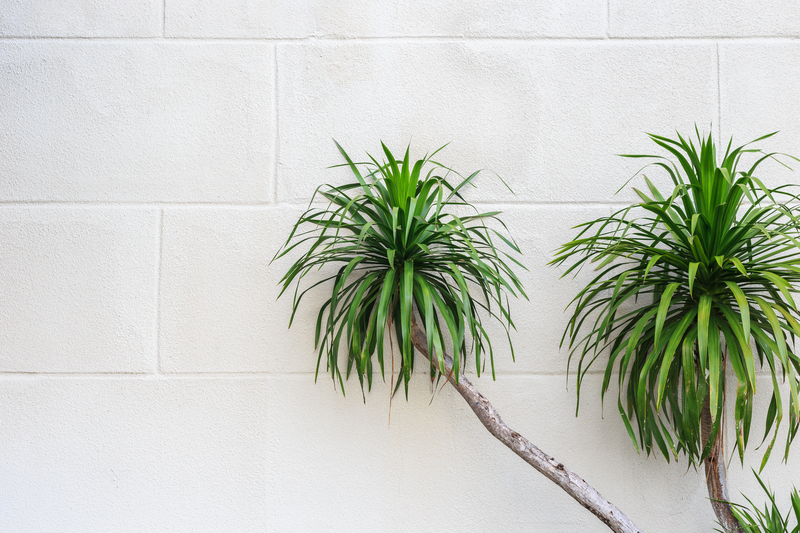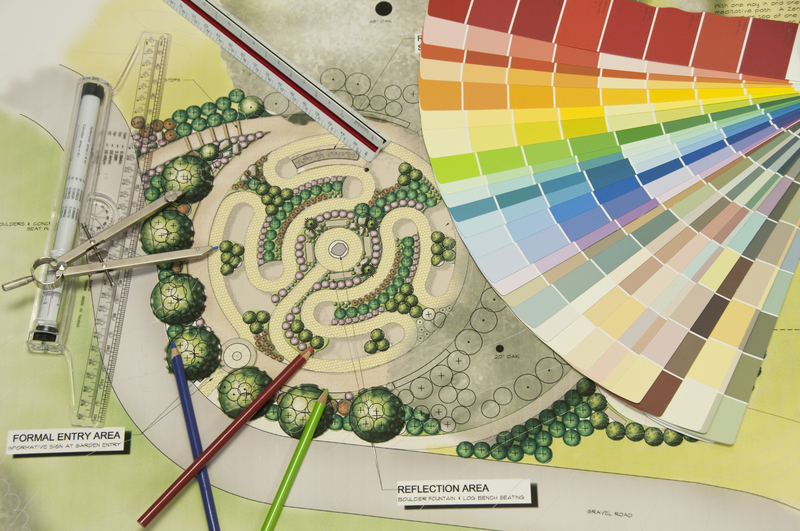Discover the Art of Serenity with Zen Garden Concepts
Posted on 07/09/2025
Discover the Art of Serenity with Zen Garden Concepts
In today's fast-paced world, many of us crave moments of peace, mindfulness, and balance. One path to tranquility is through the mindful design of physical spaces. Discover the art of serenity with Zen garden concepts as we explore how these age-old practices from Japan can revolutionize your living space and your mind.

What is a Zen Garden?
A Zen garden, also known as a Japanese rock garden or Karesansui, is a unique landscape concept that embodies the principles of Zen Buddhism. These gardens are famous for their simplicity, symbolism, and ability to evoke inner serenity through design. Traditionally, a Zen garden is a carefully composed arrangement of rocks, water features, moss, pruned trees, and gravel or sand that is raked to represent ripples in water.
- Symbolism: Each element in a Zen garden has a spiritual significance.
- Minimalism: The garden's simplicity encourages reflection and meditation.
- Balance: Strategic placement of objects fosters a sense of harmony.
- Mindfulness: Raking sand or gravel is a meditative practice for many.
The History and Philosophy Behind Zen Garden Designs
The concept of Zen gardens originated in Japan during the Muromachi period (1336-1573). Influenced deeply by Zen Buddhist philosophy, these gardens were created as places for meditation and contemplation. The design focuses on achieving a state of serenity and enlightenment through the reduction of clutter and the thoughtful arrangement of natural elements.
Zen garden concepts emphasize the beauty in imperfection, the importance of space, and the interconnectedness of all things. In this way, the garden itself becomes a tool for practicing mindfulness and appreciating the present moment.
Key Elements of Zen Garden Concepts
If you wish to experience the tranquillity a Zen garden offers, it's essential to understand the core elements that define these landscapes. Let's explore each:
1. Rocks and Stones
- Rocks represent islands, mountains, or even animals.
- Their placement is never random; it follows a balance of form and space.
2. Sand or Gravel
- Used to symbolize water, the sand or gravel is often raked in patterns.
- This act of raking is a meditative and calming practice.
3. Moss and Greenery
- Moss is commonly used to soften lines and add a sense of timelessness.
- Dwarf trees, bamboo, or shrubs further enhance the tranquil vibe.
4. Water Features
- While not always present, water creates a soothing atmosphere.
- A simple basin or a flowing stream can symbolize purity and movement.
By combining these natural features, you create a personal sanctuary where you can escape from stress and find serenity.
Benefits of Incorporating Zen Garden Ideas at Home
Whether you have a sprawling backyard or a compact balcony, Zen garden concepts can transform any space. Here are several reasons to consider embracing these designs:
- Stress Relief - Engaging in the maintenance of your garden, such as raking patterns or pruning plants, helps quiet the mind.
- Mental Clarity - The minimalist nature of Zen gardens reduces visual clutter and enhances concentration.
- Aesthetic Beauty - These gardens add unique, eye-catching features to your environment.
- Low Maintenance - Unlike traditional gardens, Zen landscapes require minimal care.
- Meditative Environment - Provides a dedicated space for meditation and mindfulness practices.
Discover the art of serenity with Zen garden concepts by making your home a haven of peace and beauty.
Designing Your Own Zen Garden: Step-by-Step Guide
Ready to bring a slice of Zen tranquility into your life? Here's a comprehensive, step-by-step guide to designing your own serene Zen garden:
1. Choose the Right Location
- Pick a peaceful spot with natural sunlight and enough room for your design.
- Even a small corner or balcony can become a Zen retreat.
2. Plan Your Layout
- Sketch your design, considering where each element will be placed.
- Think about the symbolism behind stones, sand, and plants.
3. Select Quality Materials
- Opt for natural stones, high-quality sand or gravel, and live greenery.
- Choose earthy colors to evoke harmony and authenticity.
4. Arrange Stones Thoughtfully
- Group stones in odd numbers to create dynamic, organic compositions.
- Leave space between stones to represent water or flow.
5. Add Water Features (Optional)
- A simple water basin or bamboo fountain can enhance serenity.
- The gentle sound of moving water encourages mindfulness.
6. Rake the Sand or Gravel
- Rake in patterns to symbolize waves or rippling water.
- This daily activity can become your own mindfulness ritual.
7. Maintain Balance and Simplicity
- Edit and prune regularly to retain the garden's clean, uncluttered feel.
- Allow space for quiet contemplation--less is more.
By following these steps, you can discover serenity through Zen garden concepts right at home.
Modern Zen Garden Concepts for Urban Spaces
Today, city dwellers and homeowners alike are reimagining Zen garden concepts for modern lifestyles. No matter your space constraints or style preferences, you can still capture the essence of serenity.
- Tabletop Zen Gardens: For those with limited space, a miniature version with sand, stones, and a tiny rake can fit on a desk or shelf.
- Balcony and Rooftop Retreats: Use potted bamboo, a pebble bed, and simple lanterns to craft a peaceful nook outdoors.
- Indoor Zen Spaces: Convert a corner of your living room with a small moss garden, smooth pebbles, and a sculpted sand tray.
- Hybrid Gardens: Combine minimalist Japanese design with local flora for a unique, sustainable approach.
Whichever style you choose, embrace the core principles--simplicity, balance, and a connection with nature.
Practical Zen Garden Tips for Serenity Seekers
- Use Natural Materials: Choose rocks, wood, and sand in earthy, natural hues for an authentic and calming effect.
- Focus on Quality, Not Quantity: A few well-chosen elements have more impact than a cluttered space.
- Add Symbolic Elements: Sculptures, lanterns, or water basins can enhance the spiritual feel.
- Create Designated Paths: Stepping stones guide movement and symbolize life's journey.
- Incorporate Sound: Wind chimes or a water feature can deepen the sensory experience.
Remember, the goal is not perfection but presence. Mindfully engaging with your garden creates a meaningful ritual for daily life.
Zen Garden Concepts Beyond Aesthetics: Exploring the Psychological Benefits
The impact of Zen garden architecture and layout goes beyond beauty. Numerous studies confirm the positive effects of exposure to tranquil, thoughtfully designed spaces:
- Reduces Anxiety: Quiet, ordered environments lower stress levels and promote relaxation.
- Encourages Mindfulness: The act of arranging rocks or raking sand cultivates focus and presence.
- Boosts Creativity: Time spent in calming, natural surroundings enhances creative thinking.
- Improves Well-being: Having a personal retreat encourages self-care and emotional balance.
In essence, to discover the art of serenity with Zen garden concepts is to give yourself a unique gift: a space for healing, reflection, and harmony.

Frequently Asked Questions About Zen Gardens
Can a Zen garden be created in a small area?
Yes! Even a desktop, balcony, or indoor corner can become a mindful retreat using miniature Zen garden principles.
Are Zen gardens difficult to maintain?
Not at all. Zen garden layouts are minimalistic and require little upkeep--a periodic raking, light pruning, and occasional stone rearrangement are usually enough.
What does raking sand in a Zen garden symbolize?
Raking sand or gravel represents waves or rippling water. The repetitive motion helps clear the mind, making it a meditative practice in itself.
Can I use artificial materials in a Zen garden?
While natural materials are preferred for authenticity, some urban or indoor spaces use artificial stones or sand for convenience. The core principle is to foster serenity, regardless of the medium.
Final Thoughts: Embrace the Journey to Serenity
Discovering the art of serenity with Zen garden concepts means more than creating a beautiful landscape--it's about embracing a mindset of intentional living, mindfulness, and balance. By transforming even the smallest corner of your home or workspace with these principles, you create daily opportunities for peace and introspection.
Whether through the deliberate arrangement of rocks, the gentle raking of sand, or the embrace of natural beauty, Zen garden ideas offer a timeless path to tranquility. Bring serenity to your life by exploring these transformative design philosophies and make a sanctuary where your mind and spirit can flourish.
Ready to Begin?
Start your journey--discover the art of serenity with Zen garden concepts and unlock a peaceful oasis tailored just for you.
Latest Posts
Soil Restoration through Organic Waste Magic
3 Top Tips for Effective and Simple Weed Control
Container Gardening: A Symphony of Growth

